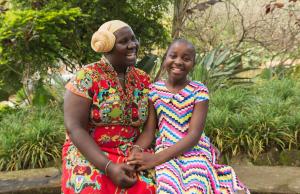Surviving cervical cancer then taking on a new battle
Nairobi, 3 February 2020
Five years ago, news that she had cervical cancer shattered Millicent Kagonga’s world. It upended her marriage, she was spurned by family and friends, and lost a child while undergoing treatment she could barely afford. Her agony seemed endless. But months of painful therapy stopped the spread of the cancer and the thirty-year-old mother of two has now taken on a fresh battle: helping patients and survivors of the disease cope better. We bring her story in her own words.
I still remember feeling an emotion, almost like pain, when the doctor said it. It is like the darkest cloud had enveloped me. I felt helpless and hopeless. He had pronounced the big word: cancer. It was heavy, cruel, and I felt desperate. What was I going to do?
I had been through a lot already. I had experienced unexplained bleeding over time. At first it was a consistent discharge. Then bleeding, which I attributed to irregular menstruation. But this continued for months and worsened. I visited several health facilities. Mostly, there was no proper diagnosis or explanation. They would send me away with antibiotics, painkillers or just regular explanations. Cancer had never been mentioned before.
At home, this unfamiliar situation had begun to draw attention. I started to feel a sense of shame. My partner had begun to tire of it. Why was it not stopping? Was it a curse? He wondered. My neighbours had taken note of it, too, because unfortunately we shared a common bathroom. What was wrong with me? What was this about? No one seemed to have the answers.
At the clinic the doctor had listened keenly. He asked various questions. He also seemed to have understood something. He then did some further observations. Then he asked me to sit down so he could speak to me. He also showed me some pictures of a woman’s anatomy in relation to my problem. It seemed I had been suffering from cervical cancer for some years and I had not known. He explained some next steps I needed to take. I felt lost and desperate. It did not matter because I figured I was going to die after all. Die young (at 25) and leave my children. Was this it?
I found it hard to deal with it or to tell anyone. After all, word had already spread around that I had a strange disease. Some neighbours and friends would not share a meal with me or eat from my pot. I had moved from my initial house to save myself the shame. But things had not gotten better. My husband had shown little sympathy with my situation and was seemingly not honouring our relationship and marriage any more. In fact, he had asked me to leave. I felt stigmatized.
It then occurred to me that the best thing to do was to go to (my rural) home in Western Kenya. My children were there with my family and I could go and die there. I even considered taking my life. But while at home I got the courage to visit the nearby hospital … to follow up on the doctor’s advice. This is where I got the first glimmer of hope. The doctors there took quick action after further observation of my condition. They told me I had stage-four cancer which required that I go through certain procedures for treatment. They then referred me to Kenyatta National Hospital in Nairobi where I could undergo chemotherapy, radiotherapy and other treatment I needed. This process took about six months because I did not have the funds needed. This meant that now and then I missed my appointment until I could raise money for treatment. The clinic is also very busy because it serves the whole country.
While this was a very difficult process, it gave me hope in that I felt I could live longer and take care of my children. Last September, my daughter Grace received the HPV (human papillomavirus) vaccine which the country introduced to counter cervical cancer. The news that cervical cancer could be stopped and that girls could be vaccinated against it truly gratified my heart. I decided immediately that my daughter would be vaccinated because I never want her to go through the nightmare I have gone through. I don’t want her or her brother to be the subject of stigma that I have experienced or have her life so shaken and threatened like I have been. No child or woman should go through what I have experienced. So these days I speak to every mother and father I meet to encourage them to have their daughters vaccinated against HPV.
My battle with cancer also empowered me with knowledge of the problem, which I use to encourage other women to go for their regular check-ups and to support anyone needing help when they get the disease. I particularly help all cancer patients in my community because I realize how difficult it is when one is told they have the disease. I often I speak at community gatherings, in church and even in some schools where I am invited. I do it so no one else is stigmatized and so new patients can be hopeful. I also speak to husbands and men in general so they can treat their partners better when they get such a disease.
I have been free of cervical cancer since 2018, but aware that it can recur. But I just keep positive. We have to inspire community and allow our children to dream and live in a positive environment.
Communications & Social Mobilisation
Tel: +254 722509403
Cell: +254 710 149489
Email: mwakishaj [at] who.int (mwakishaj[at]who[dot]int)
WHO Regional Office for Africa
Acting Regional Communications Manager
Email: ottob [at] who.int (ottob[at]who[dot]int)



